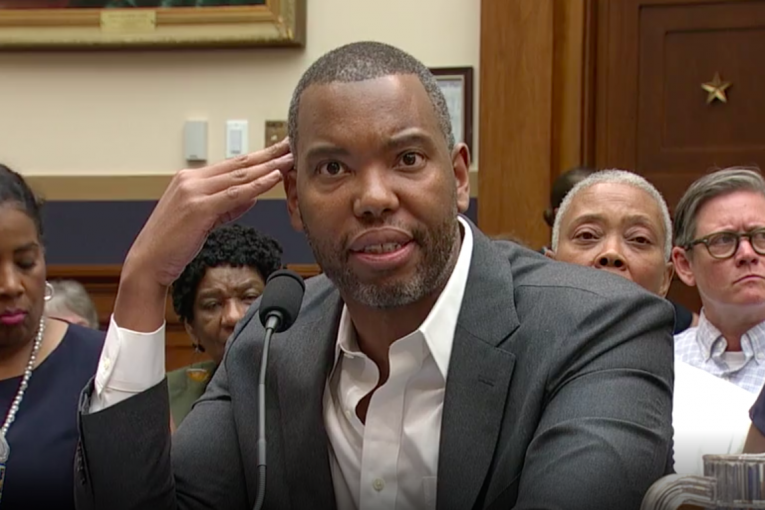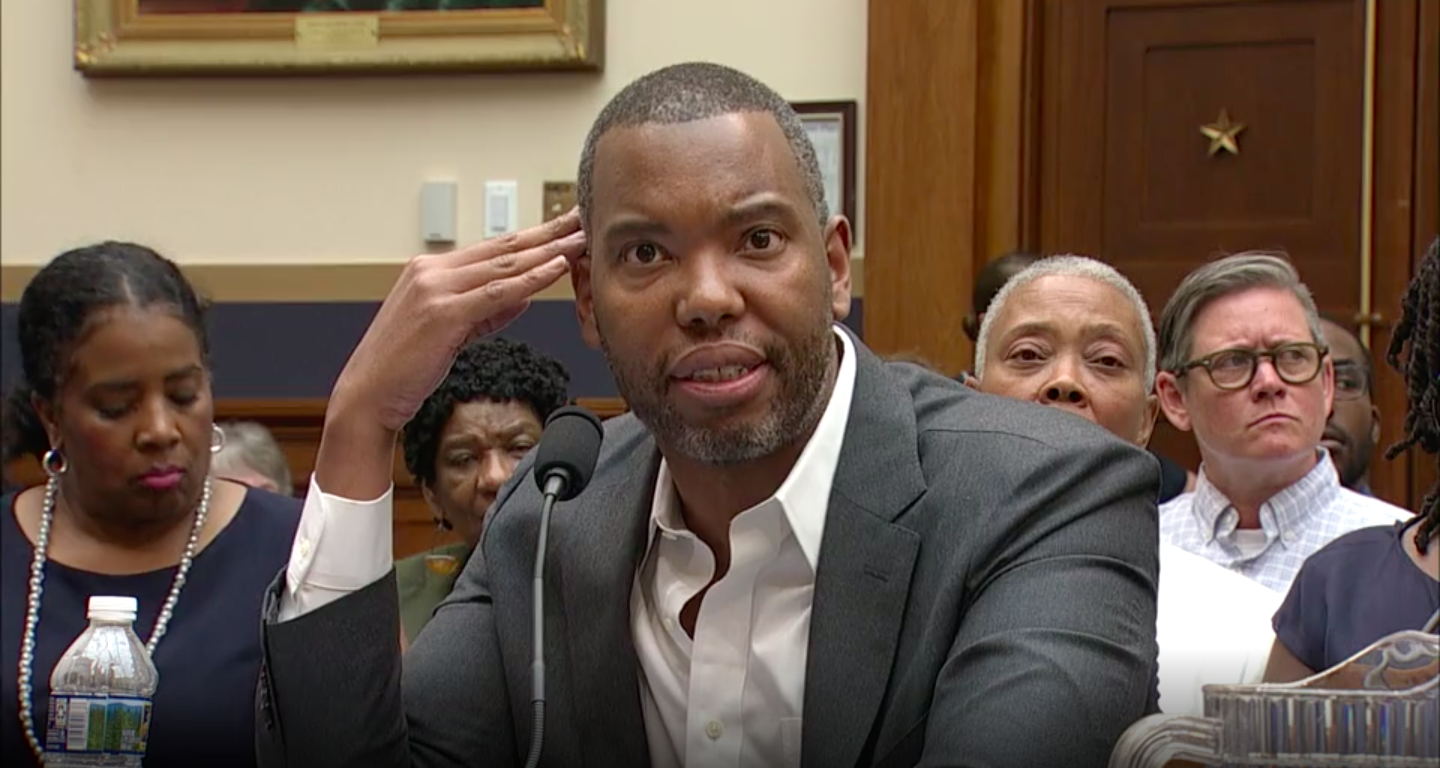

As we celebrated the end of slavery on Juneteenth, yesterday, once again the idea of slavery reparations came up. Senator Mitch McConnell strongly opposed the idea, noting, “I don’t think reparations are a good idea.”
The Republican senator called slavery something “that happened 150 years ago for whom none of us currently living are responsible.”
However, Representative Sheila Jackson Lee is sponsoring HR 40, which would create a commission to study and develop proposals for slavery reparations.
On Wednesday, Ta-Nehisi Coates, a writer who authored a piece in The Atlantic laying out the Case for Reparations, responded to the Senator’s comments.
Full comments:
Yesterday, when asked about reparations, Senate Majority Leader Mitch McConnell offered a familiar reply: America should not be held liable for something that happened 150 years ago, especially since none of us currently alive are responsible. This rebuttal proffers a strange theory of governance: that American accounts are somehow bound by the lifetime of its generations, when well into this century, the United States was still paying out pensions to the heirs of Civil War soldiers. We honor treaties that date back some 200 years, despite no one being alive who signed those treaties. Many of us would love to be taxed for the things we are solely and individually responsible for, but we are American citizens, and thus bound to a collective enterprise that extends beyond our individual and personal reach. It would seem ridiculous to dispute invocations from the Founders or the Greatest Generation, on the basis of a lack of membership in either group. We recognize our lineage as a generational trust, as an inheritance and the real dilemma posed by reparations is just that: a dilemma of inheritance.
It is impossible to imagine America without the inheritance of slavery. As historian Ed Baptist has written, enslavement “shaped every crucial aspect of the economy and politics” of America, so that by 1836 more than $600 million, almost half of the economic activity in the United States, derived directly or indirectly from the cotton produced by the million-odd slaves. By the time the enslaved were emancipated, they comprised the largest single asset in America. Three billion in 1860 dollars — more than all the other assets in the country combined. The method of cultivating this asset was neither gentle cajoling nor persuasion, but torture, rape, and child trafficking.
Enslavement reigned for 250 years on these shores. When it ended, this country could have extended its hallowed principles — life, liberty, and the pursuit of happiness — to all, regardless of color. But America had other principles in mind. And so, for a century after the Civil War, black people were subjected to a relentless campaign of terror, a campaign that extended well into the lifetime of Majority Leader McConnell. It is tempting to divorce this modern campaign of terror, of plunder, from enslavement, but the logic of enslavement, of white supremacy, respects no such borders, and the guard  of bondage was lustful and begat many heirs. Coup d’états and convict leasing. Vagrancy laws and debt peonage. Redlining and racist G.I. bills. Poll taxes and state-sponsored terrorism.
of bondage was lustful and begat many heirs. Coup d’états and convict leasing. Vagrancy laws and debt peonage. Redlining and racist G.I. bills. Poll taxes and state-sponsored terrorism.
We grant that Mr. McConnell was not alive for Appomattox. But he was alive for the electrocution of George Stinney. He was alive for the blinding of Isaac Woodward. He was alive to witness kleptocracy in his native Alabama and a regime premised on electoral theft. Majority Leader McConnell cited civil-rights legislation yesterday, as well he should, because he was alive to witness the harassment, jailing, and betrayal of those responsible for that legislation by a government sworn to protect them. He was alive for the redlining of Chicago and the looting of black homeowners of some $4 billion. Victims of that plunder are very much alive today. I am sure they’d love a word with the majority leader. What they know — what this committee must know — is that while emancipation deadbolted the door against the bandits of America, Jim Crow wedged the windows wide open. And that is the thing about Senator McConnell’s “something.” It was 150 years ago, and it was right now.
The typical black family in this country has one tenth the wealth of the typical white family. Black women die in childbirth at four times the rate of white women. And there is, of course, the shame of this land of the free boasting the largest prison population on the planet, of which the descendants of the enslaved make up the largest share. The matter of reparations is one of making amends and direct redress, but it is also a question of citizenship. In H.R. 40, this body has a chance to both make good on its 2009 apology for enslavement, and reject fair-weather patriotism, to say that this nation is both its credits and debits. That if Thomas Jefferson matters, so does Sally Hemings. That if D-Day matters, so does Black Wall Street. That if Valley Forge matters, so does Fort Pillow. Because the question really is not whether we’ll be tied to the somethings of our past, but whether we are courageous enough to be tied to the whole of them. Thank you.
A comments and debate come a day after California Governor Gavin Newsom issued an apology through executive order on behalf of California to California Native American Peoples for the many instances of violence, mistreatment and neglect inflicted upon California Native Americans throughout the state’s history.
From the Governor’s Press Release:
The Governor also announced the creation of a Truth and Healing Council to provide an avenue for California Native Americans to clarify the record – and provide their historical perspective – on the troubled relationship between tribes and the state. This is the first time a state has taken dual action to correct the historical record and acknowledge wrongdoing through executive order mandate and a tribally-led, consultation-informed council.
“California must reckon with our dark history,” said Governor Gavin Newsom. “California Native American peoples suffered violence, discrimination and exploitation sanctioned by state government throughout its history. We can never undo the wrongs inflicted on the peoples who have lived on this land that we now call California since time immemorial, but we can work together to build bridges, tell the truth about our past and begin to heal deep wounds.”
“As the first California Indian elected to the State Legislature, I applaud the executive order signed by Governor Newsom today to issue a formal apology from the state for past cruel treatment of Native Americans. This action will go a long way to start the healing process between the state and Native American communities throughout California,” said Assemblymember James Ramos. “This historic acknowledgment by the Governor marks the beginning of a new relationship between the state and the more than 700,000 Native Americans who make the State of California their home.”
In the early decades of California’s statehood, the relationship between the state and California Native Americans was fraught with violence, exploitation, dispossession and the attempted destruction of tribal communities. In 1850, California passed a law called the “Act for the Government and Protection of Indians,” which facilitated removing California Native Americans from their traditional lands, separating children and adults from their families, languages and culture, and creating a system of indentured servitude as punishment for minor crimes such as loitering.
Between 1850 and 1859, governors of California called for private and militia campaigns against Native peoples in the state. In his 1851 State of the State Address, California’s first Governor declared “[t]hat a war of extermination will continue to be waged between the two races until the Indian race becomes extinct must be expected.” Subsequently, the state authorized $1.29 million in 1850’s dollars to subsidize these militia campaigns.
Despite these wrongs, California Native Americans resisted, survived and carried on cultural and linguistic traditions defying all odds. Now, at the direction of Governor Newsom and working in collaboration with California tribes, the state seeks to more closely explore the historical relationship between the State of California and California Native Americans in the spirit of truth and healing through the establishment of a Truth and Healing Council. The Council will be led and convened by the Governor’s Tribal Advisor and will include representatives or delegates from California Native American tribes, relevant state and local agencies and other relevant non-governmental stakeholders. The Council will report draft findings to the Governor’s Tribal Advisor on an annual basis beginning January 1, 2020 and produce a final written report of findings regarding the historical relationship between the state and Native Americans on or before January 1, 2025.
The State of California and California Native Americans have never jointly or formally examined or documented their relationship for the express purpose of acknowledging and accounting for historical wrongs committed by the State of California against California Native Americans – and the state has never formally apologized for these atrocious actions.
A copy of the Governor’s executive order can be found here.


I read and listened to Coates’ statement. There are some interesting historical references that were unknown to me and worth checking out:
George Stinney
Isaac Woodard
Fort Pillow Massacre